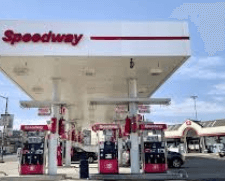Speedway Net Worth: A Look at the Gas Station Chain’s Wealth

Speedway has established itself as a formidable player in the fuel retail sector, characterized by a significant network of gas stations and convenience stores. Since its inception in 1996, the company has navigated a landscape marked by strategic acquisitions and a diversified revenue model, resulting in impressive financial metrics. However, as we explore the intricacies of Speedway’s net worth, it becomes essential to consider not only its current standing but also the future implications of industry trends and competitive dynamics that may influence its trajectory. What lies ahead for this gas station chain?
Overview of Speedway
Speedway, a prominent player in the fuel retail industry, operates a vast network of convenience stores and gas stations across the United States, catering to millions of customers annually.
By prioritizing customer experience through quality service and a diverse product range, Speedway fosters brand loyalty.
This strategic focus not only enhances customer retention but also drives revenue growth in a competitive marketplace.
Historical Background
The historical background of Speedway reveals a trajectory characterized by its founding and subsequent expansion across the United States.
Key financial milestones, including acquisitions and revenue growth, have significantly influenced its current market position.
Today, Speedway stands as a prominent player in the convenience store sector, reflecting the cumulative impact of its strategic developments over the years.
Founding and Expansion
Founded in 1996, Speedway has undergone significant expansion through strategic acquisitions and the development of a robust convenience store model, positioning itself as a leading player in the fuel and retail industry.
The founding vision emphasized customer accessibility, while its expansion strategy focused on acquiring key locations, enhancing brand presence, and diversifying product offerings, ultimately driving growth and profitability in a competitive market.
See also: Spencer Jennings Net Worth: A Look at the Influencer’s Wealth
Key Financial Milestones
Significant financial milestones in Speedway’s history reflect its strategic growth trajectory and operational successes, marking pivotal moments that have shaped its market position and profitability over the years.
Key financial achievements, such as the successful acquisition of various locations and the expansion of services, provide critical insight through milestone analysis.
This illustrates how Speedway has effectively navigated competitive challenges to enhance its financial standing and market reach.
Market Position Today
Positioned as a leading player in the convenience store and fuel retail sector, Speedway has leveraged strategic acquisitions and market expansion to solidify its presence across the United States.
Analyzing current market trends reveals shifts in consumer behavior towards convenience and quality, driving Speedway’s innovation in service offerings and product selection.
This adaptability positions the chain favorably against competitors in an evolving landscape.
Speedway’s Market Presence
Speedway maintains a robust market presence through a strategic network of convenience stores and fuel stations, catering to a diverse customer base across multiple states.
This extensive footprint fosters brand loyalty, allowing Speedway to adapt to evolving consumer preferences effectively.
Financial Performance Metrics
Analyzing Speedway’s financial performance metrics reveals a consistent upward trajectory in revenue growth, driven by strategic expansions and operational efficiencies.
The company’s financial ratios indicate strong liquidity and solvency, while profitability analysis showcases robust margins and return on equity.
These metrics underscore Speedway’s resilience and capability to capitalize on market opportunities, thereby enhancing its financial stability and fostering long-term growth potential.
Revenue Sources
A comprehensive examination of Speedway’s revenue sources reveals that the company generates income from a diversified portfolio, including fuel sales, convenience store merchandise, and food service offerings, each contributing to its overall financial performance.
| Revenue Source | Contribution Impact |
|---|---|
| Fuel Sales | High |
| Convenience Offerings | Moderate |
| Food Service | Moderate |
| Additional Services | Low |
Strategic Acquisitions
Strategic acquisitions have played a pivotal role in enhancing Speedway’s market presence and operational capabilities. This allows the company to leverage synergies and expand its footprint within the competitive retail landscape.
Competitive Landscape
The competitive landscape surrounding Speedway is characterized by several key industry players vying for market share, including major convenience store and fuel retailers.
A thorough market position analysis reveals Speedway’s strengths and weaknesses relative to these competitors, as well as emerging trends in recent acquisitions that could reshape the sector.
Understanding these dynamics is crucial for evaluating Speedway’s net worth and future growth potential.
Major Industry Competitors
In an increasingly competitive market, Speedway faces significant challenges from major industry players such as Circle K, Murphy USA, and 7-Eleven, each striving to capture a larger share of the fuel and convenience store sectors.
These industry leaders leverage strategic pricing, customer loyalty programs, and expansive networks to enhance their market share, intensifying the competition and compelling Speedway to innovate and adapt to evolving consumer demands.
Market Position Analysis
Amidst the competitive pressure exerted by industry rivals, Speedway’s market position reflects a blend of strengths and vulnerabilities that shape its strategic approach to maintaining and expanding its footprint in the fuel and convenience store sectors.
With a significant market share, Speedway adapts to shifts in consumer behavior by enhancing service offerings and optimizing locations, ensuring resilience against emerging competitors in a dynamic marketplace.
Recent Acquisitions Trends
Recent trends in acquisitions within the convenience store and fuel sectors indicate a strategic focus on expanding market presence and enhancing operational efficiencies, positioning companies like Speedway to capitalize on evolving consumer preferences and competitive dynamics.
Speedway’s acquisition strategy aims to streamline operations while pursuing market expansion, thus enabling the chain to leverage synergies, optimize supply chains, and ultimately drive profitability amidst fierce competition.
Future Growth Prospects
Analyzing the current market trends and expansion strategies, Speedway appears poised to capitalize on emerging opportunities within the convenience store sector, potentially driving significant growth in the coming years. With a focus on future investments and robust growth strategies, Speedway’s potential for expansion can be further illustrated through the following data:
| Year | Projected Revenue Growth | Key Investment Areas |
|---|---|---|
| 2024 | 10% | Technology & Services |
| 2025 | 12% | Sustainability Initiatives |
| 2026 | 15% | New Store Locations |
| 2027 | 18% | Digital Marketing |
Impact of Industry Trends
Current industry trends reveal a shift towards increased consumer demand for convenience and digital integration, which significantly influences Speedway’s market positioning and operational strategies.
Industry innovations such as mobile payment systems and loyalty programs cater to evolving consumer behavior, enhancing customer engagement.
As Speedway adapts to these trends, its ability to remain competitive and profitable in a rapidly changing landscape becomes increasingly critical.
See also: Spencer Kirk Net Worth: A Look at the Businessman’s Wealth
Conclusion
In conclusion, Speedway’s impressive net worth serves as a testament to the paradox of a gas station chain thriving amidst an era increasingly focused on sustainability.
While environmental concerns loom large, the company continues to flourish, proving that the demand for convenience often outweighs eco-conscious choices.
With strategic acquisitions and a diversified revenue portfolio, Speedway exemplifies the irony of success in a sector seemingly at odds with modern values, ensuring its place in the fuel retail industry for years to come.




